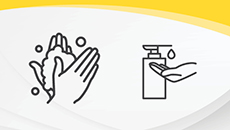Prevention

Learn More

It's important for everyone to recognize the symptoms of COVID-19 and understand its risk factors.
Being familiar with coronavirus symptoms and understanding how the coronavirus spreads allows you to better protect yourself and others.
Most people will experience mild symptoms and can treat COVID at home.
These symptoms may appear 2-14 days after exposure to the virus:
Diarrhea and other gastrointestinal symptoms, with or without respiratory symptoms, have been reported. These people may be contagious and spreading the disease even if they are only mildly sick.
Many illnesses, like seasonal allergies, the common cold and seasonal flu, exhibit similar symptoms. To determine if the cause could be the coronavirus, you should also ask yourself the following questions:
Did you have close contact with a diagnosed COVID-19 patient? Close contact means that you spent time within 6 feet of the person or have come into direct contact with their saliva through coughing or sneezing.
Have you visited an area that has high community transmission of COVID 19? If you have traveled, consider if you visited a city, state or country with COVID-19 spread.
Are you at a higher risk for coronavirus? Based on the evidence we have so far, older adults and people with chronic diseases are most susceptible to serious complications from the virus.
If you have developed these symptoms, here are a few next steps you can take based on your symptoms and health history.
Call 911. Let the dispatcher know about your concerns, symptoms and travel history.
Hospitals are safe places to go for care. Do not ignore your body. Stay-at-home orders do not apply to people experiencing medical emergencies or those who need urgent medical care.
Reviewed 12/17/2021
UMMS provides our expert-reviewed content to keep our community informed. When sharing this copyrighted content, please link to our site so that critical updates are reflected.